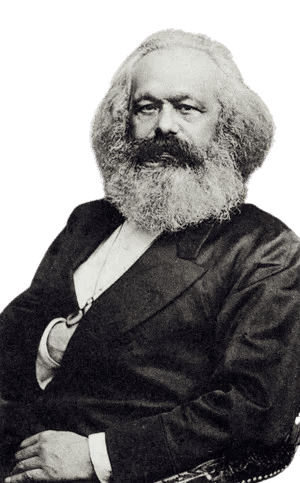Life and achievements
Early life
Karl Marx was born on May 5, 1818, in Trier, Prussia, into a family of a prosperous merchant of Dutch origin, Heinrich Marx, and a woman of Jewish origin, Henrietta Pressburg. His father, Heinrich Marx, was a lawyer who had embraced Lutheranism in his practice, while his mother, Henriette, had Jewish ancestry as she was the daughter of a rabbi. Marx was born into a family involved in politics, which exposed him to the works of Enlightenment writers like Voltaire and Rousseau. His education started at the University of Bonn, where he first chose the law faculty due to his father's influence. Soon, however, he became more interested in philosophy and history.
Marx moved to the University of Berlin, where he engaged himself in the works of the German idealists, including Hegel. During his stay in Berlin, Marx associated himself with the Young Hegelians, a group of philosophers who opposed religious and political systems. He received his doctorate in the philosophy of nature, but political oppression abruptly ended his scholarship. Marx's early life, including his education, tutors, and the political situation in Prussia at the time, shaped his radical ideas concerning society, economy, and class.
Legacy
Karl Marx has significantly impacted political theory and political practice in all countries in the world. His theories paved the way for the socialist and communist movements that occurred at the end of the nineteenth and twentieth centuries. Marx's ideas on a society without classes, with the workers owning the means of production, led to the Russian Revolution of 1917 and other communist revolutions. His ideas paved the way for the formation of the Soviet Union, Maoist China, and other socialist countries, and his works were used to prop up revolution and state-controlled economies.
However, some problems and issues are connected with Marx's name. Some people attribute him to giving a blueprint on how the working class can be emancipated, while others blame the authoritarian regimes that sought to implement his theories. Nevertheless, Marx's critique of capitalist society is still valid in modern society, especially in the globalized economy, where issues of inequality, labor oppression, and financial crises are still topical in the discourse on economic justice. His work has also influenced academic disciplines such as sociology, economics, and political theory, where ideas such as alienation, historical materialism, and class conflict are used to explain the modern world.
Milestone moments
Feb 6, 1848
The publication of the book The Communist Manifesto
Karl Marx and Friedrich Engels wrote the Communist Manifesto in February of 1848 to explain the tenets of communism.
It became one of the greatest political documents in history, demanding the elimination of private property and the overthrow of the capitalist order.
The manifesto was the precursor of European socialist activities and instigated political revolutions in 1848.
Its demand that the working class unite in the fight against the bourgeoisie was an appeal that would be embraced by global labor movements, thus becoming a foundation for Marxist ideologies.
Sep 25, 1867
Publication of Das Kapital
Karl Marx's Das Kapital, the first volume of his work on capitalist economies, was published in 1867.
In this work, Marx also developed the theory of surplus value, which he used to explain how capitalists can profit from workers.
The book is considered a classic work in economics and political science because it analyzes the contradictions and exploitation of the capitalist world.
At first, Das Kapital did not receive much attention, but it was later adopted by socialists and communists and influenced the political development of the twentieth century.
Aug 20, 1872
IWA and Marx's Impact
Marx attended the Hague Congress of the International Workingmen's Association, also known as the First International, in August 1872.
Marx, one of the leaders of the IWA, was an ardent supporter of workers' rights, the end of Capitalism, and the introduction of socialism.
His authority within the organization established him as a critical figure within the international labor movement.
The IWA succeeded in spreading Marxist ideas, which paved the way for socialist revolutions in the future, such as the one in Russia and other European countries.
Mar 19, 1875
Critique of the Gotha Program
The Gotha program was the party program of German social democracy, the SDAP, adopted in 1875. Karl Marx wrote the program in collaboration with Friedrich Engels.
Later, in March 1875, Marx prepared the Critique of the Gotha Program, a critique of the political program of the Social Democratic Party of Germany.
Marx criticized the party's program as too moderate and not reflecting the spirit of class struggle and revolutionary transformations.
This work offered the significant elements of Marxist theory, including the concept of the proletariat's dictatorship and the need to transition from Capitalism to communism.
Marx's Critique of the Gotha Program is considered one of the most significant texts in Marxist theory and practice, as it defines the further development of socialist movements.
